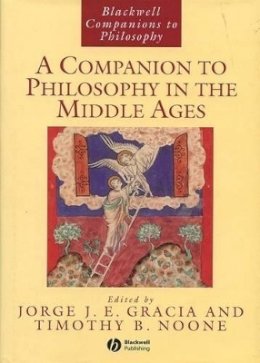
Stock image for illustration purposes only - book cover, edition or condition may vary.
A Companion to Philosophy in the Middle Ages
Gracia
€ 274.82
FREE Delivery in Ireland
Description for A Companion to Philosophy in the Middle Ages
Hardback. Features essays by some of the most distinguished scholars in the field. Organized into two sections, this book is cross-referenced and indexed, constituting information for students and professionals. Editor(s): Gracia, Jorge J. E.; Noone, Timothy B. Series: Blackwell Companions to Philosophy. Num Pages: 768 pages, 0. BIC Classification: HPCB. Category: (P) Professional & Vocational; (UP) Postgraduate, Research & Scholarly; (UU) Undergraduate. Dimension: 260 x 189 x 48. Weight in Grams: 1548.
This comprehensive reference volume features essays by some of the most distinguished scholars in the field.
- Provides a comprehensive "who's who" guide to medieval philosophers.
- Offers a refreshing mix of essays providing historical context followed by 140 alphabetically arranged entries on individual thinkers.
- Constitutes an extensively cross-referenced and indexed source.
- Written by a distinguished cast of philosophers.
- Spans the history of medieval philosophy from the fourth century AD to the fifteenth century.
Product Details
Format
Hardback
Publication date
2002
Publisher
John Wiley and Sons Ltd United Kingdom
Number of pages
768
Condition
New
Series
Blackwell Companions to Philosophy
Number of Pages
764
Place of Publication
Hoboken, United Kingdom
ISBN
9780631216728
SKU
V9780631216728
Shipping Time
Usually ships in 7 to 11 working days
Ref
99-50
About Gracia
Jorge J. E. Gracia is Samuel P. Capen Chair and Distinguished Professor of Philosophy at the State University of New York at Buffalo. He is author of several books, including Hispanic/Latino Identity (Blackwell, 2000) and How Can We Know What God Means? (2001). He is the editor, with Gregory M. Reichberg and Bernard N. Schumacher, of The Classics of Western Philosophy (Blackwell, 2003). Timothy B. Noone is Ordinary Professor of Philosophy at The Catholic University of America. His books include Ioannes Duns Scoti, Quaestiones super librum Porphyrii, Quaestiones super Praedicamenta (1999).
Reviews for A Companion to Philosophy in the Middle Ages
"Having these key figures present in one volume is sorely needed in the field, and this book provides...a one-volume reference work to fill the gap. As part of the Blackwell Companions to Philosophy series, I highly recommend this work." Reference Reviews "A very useful tool indeed both for specialists and amateurs! It brings together a remarkable bunch among the best scholars in the field from all over the world. The information is rich, precise, and up-to-date; yet the arrangement of the material is simple and handy." Claude Panaccio, Université du Québec à Trois-Rivières "An unparalleled source of information on the lives and thought of no fewer than 138 medieval Christian, Islamic, and Jewish philosophers. There are substantial essays here on the well-known heavyweights, such as Augustine, Averroes, Aquinas, Maimonides, and Ockham, but also useful accounts of the somewhat less well known, and the essential minimum on the various shadowy figures of the period, such as Berthold of Moosburg and William of Ware. This book is a ‘must-have’ for any serious student of medieval philosophy or theology." Gareth B. Matthews, University of Massachusetts, Amherst "This volume is a welcome addition to the currently available reference works on medieval philosophy. Its well-written historical articles and its concise and helpful entries on almost 140 medieval philosophers makes this book an indispensable scholarly tool for specialists and non-specialists alike." Eleonore Stump, St. Louis University "This is an impressive collection of work on a perennially underappreciated period of philosophical thought, and I will certainly be recommending it both to my students and to colleagues as a valuable resource in gaining familiarity with medieval thought, within and without the Latin West." - Christina Van Dyke, Calvin College
